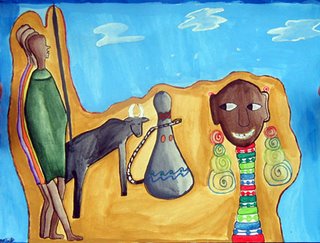Bride "Price" or Bride "Wealth"?
 My current research has me delving into African religious practices as part of a paper for the upcoming SBL on the shades and the hereafter in the Hebrew Bible. (I'm sure I'll be posting on this research subsequently.) While reading an excellent book on African Religions and Philosophy by John S. Mbiti, I was reminded that often we westerners mis-apprehend the practice of bride wealth (cf. 1 Sam 18:27). Mbiti writes, "Under no circumstances is this custom a form of 'payment,' as outsiders have so often mistakenly said. ...The two families are involved in a relationship which, among other things, demands an exchange of material and other gifts. This continues even long after the girl is married and has her own children." Further, Mbiti writes, "This marriage gift...is a token of gratitude on the part of the bridegroom's people. ...At her home the gift 'replaces' her, reminding the family that she will leave or has left and yet she is not dead. She is a valuable person."
My current research has me delving into African religious practices as part of a paper for the upcoming SBL on the shades and the hereafter in the Hebrew Bible. (I'm sure I'll be posting on this research subsequently.) While reading an excellent book on African Religions and Philosophy by John S. Mbiti, I was reminded that often we westerners mis-apprehend the practice of bride wealth (cf. 1 Sam 18:27). Mbiti writes, "Under no circumstances is this custom a form of 'payment,' as outsiders have so often mistakenly said. ...The two families are involved in a relationship which, among other things, demands an exchange of material and other gifts. This continues even long after the girl is married and has her own children." Further, Mbiti writes, "This marriage gift...is a token of gratitude on the part of the bridegroom's people. ...At her home the gift 'replaces' her, reminding the family that she will leave or has left and yet she is not dead. She is a valuable person."
 My current research has me delving into African religious practices as part of a paper for the upcoming SBL on the shades and the hereafter in the Hebrew Bible. (I'm sure I'll be posting on this research subsequently.) While reading an excellent book on African Religions and Philosophy by John S. Mbiti, I was reminded that often we westerners mis-apprehend the practice of bride wealth (cf. 1 Sam 18:27). Mbiti writes, "Under no circumstances is this custom a form of 'payment,' as outsiders have so often mistakenly said. ...The two families are involved in a relationship which, among other things, demands an exchange of material and other gifts. This continues even long after the girl is married and has her own children." Further, Mbiti writes, "This marriage gift...is a token of gratitude on the part of the bridegroom's people. ...At her home the gift 'replaces' her, reminding the family that she will leave or has left and yet she is not dead. She is a valuable person."
My current research has me delving into African religious practices as part of a paper for the upcoming SBL on the shades and the hereafter in the Hebrew Bible. (I'm sure I'll be posting on this research subsequently.) While reading an excellent book on African Religions and Philosophy by John S. Mbiti, I was reminded that often we westerners mis-apprehend the practice of bride wealth (cf. 1 Sam 18:27). Mbiti writes, "Under no circumstances is this custom a form of 'payment,' as outsiders have so often mistakenly said. ...The two families are involved in a relationship which, among other things, demands an exchange of material and other gifts. This continues even long after the girl is married and has her own children." Further, Mbiti writes, "This marriage gift...is a token of gratitude on the part of the bridegroom's people. ...At her home the gift 'replaces' her, reminding the family that she will leave or has left and yet she is not dead. She is a valuable person."
4 Comments:
Steve,
Having lived in East Africa (Tanzania) I can attest that you are very much on target with this post. You see this happening just the way it is described in this post.
Cheers
Joe Cathey
Thanks Joe!
I hope you don't mind, I've added a link to your blog in my sidebar.
Best,
---Steve
When I was in Sudan (see earlier posts!), I was fascinated by the Dinka marriage practices that I discussed with some Dinka clergy. Made me think of Stephanie Coontz's recent book on marriage that we read in ethics at VTS last year, about how marriage used to be more about kinship ties, not love.
Interesting, Elizabeth! Your comment reminds me of Ruth 3:10, where Ruth puts kindness and kinfolk above personal happiness in a marriage to a young, dashing gallant. Of course, love and kinship ties need not be mutually exclusive... I'd love to hear more about what the Dinka clergy were saying...
---Stephen C.
Post a Comment
<< Home